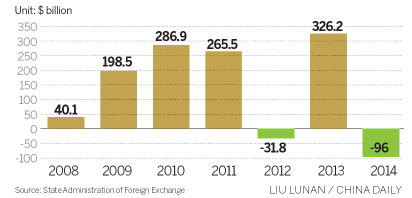

Balance of China's capital and financial account
The nation posted a deficit of $96 billion under its capital and financial account last year, larger than the $31.8 billion recorded in 2012, underscoring a shift to increasing outbound investment, data from the State Administration of Foreign Exchange showed on Tuesday.
The figure was a sharp contrast to a surplus of $362.2 billion in 2013, sparking concerns of possible capital flight as companies and individuals anticipate a slowing economy and stronger dollar.
But economists shrugged off those concerns, saying that the capital account deficit reflected that the country has entered a period of capital exports, driven by increasing outbound investment and acquisitions by State-owned and private enterprises.
"The era of the 'double surplus' under both the current and capital accounts, which were based on an obsolete growth mode driven by exports and foreign investment, has ended," said Zhao Xijun, deputy dean of the School of Finance at Renmin University of China in Beijing.
Domestic overcapacity, a side effect of the 4 trillion yuan ($640 billion) stimulus package to cope with the global financial crisis in 2008 and 2009, prompted the government to encourage companies to engage in outbound investment, which has resulted in capital outflows, Zhao said.
China became a net capital exporter for the first time last year with outbound investment surging to $102.89 billion, according to the Ministry of Commerce.
Xu Hongcai, an economist at the China Center for International Economic Cooperation, said that the widening capital account deficit does not necessarily indicate an uncontrollable risk of capital flight as the country still maintains a sizable current account surplus.
That surplus last year was $213.8 billion, which Xu said could help offset the pressure of capital outflows.
"The deficit under the capital account will also help reduce the country's pressure on its mounting foreign exchange reserves and allow the country to move toward the goal of achieving a balance in its international payments," he said.
But Xu said that the divergence in the monetary policies of the United States and the eurozone will further complicate China's foreign exchange policies.
The yuan depreciated for four days in a row last week, touching the lower limit of the 2 percent daily trading band set by the People's Bank of China, the country's central bank.
While the yuan has lost value against the dollar, it has appreciated against other major currencies, including the euro, the British pound and the yen.
Xu forecast the yuan will continue to depreciate against the dollar this year by 2 to 4 percent.
China sees capital, financial account deficit
2015-02-04Venture capital investment hits record high
2015-02-03Pursuit of human capital ‘key part‘ of acquisition drive
2015-01-28China invests $240b insurance capital overseas
2015-01-23China to focus on reforms, opening of capital market
2015-01-23Capital outflow risks ‘manageable‘
2015-01-23Copyright ©1999-2018
Chinanews.com. All rights reserved.
Reproduction in whole or in part without permission is prohibited.